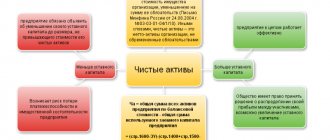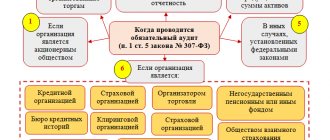Violations of reporting procedures
This group includes:
1. Late submission of the declaration (Article 119 of the Tax Code of the Russian Federation). It threatens to impose a fine on the company in the amount of 5% of the tax reflected for payment in the declaration. It is charged for each month of delay (both full and incomplete). In this case, the minimum fine is 1,000 rubles. (even if there are no accruals), and the maximum is 30% of the accrued tax (which is equivalent to 6 months of delay).
See also:
- “Amounts of fines for failure to submit tax reports”;
- “What is the size of the fine for failure to file a VAT return in 2019-2020?”
2. Violation of the method of sending the declaration (Article 119.1 of the Tax Code of the Russian Federation). Applies to companies required to submit electronic reports (clause 3 of Article 80 of the Tax Code of the Russian Federation). This:
- largest taxpayers;
- enterprises with an average workforce of more than 100 people.
If the declaration is sent to the tax authorities in any other way, the company will be fined. The fine amount is 200 rubles.
Amounts of fines
If filing a declaration is delayed, the entrepreneur will pay a minimum fine of 1,000 rubles. In addition, you will have to pay from 5% to 30% of the unpaid tax amount for each month of delay - says Article 119 of the law. Moreover, it does not matter here whether the month was full or not.
If you nevertheless paid the tax, and the delay occurred only with documents, the fine will be minimal - 1000 rubles. Failure to submit a zero declaration faces the same penalty.
If an entrepreneur operates under a simplified taxation system, then the consequences for failing to submit a document can be even more serious. If an individual entrepreneur is more than 10 days late in submitting a declaration, then his accounts may be frozen in accordance with Article 76 of the Tax Code of the Russian Federation. That is, you will no longer be able to make any transactions on your accounts, with the exception of mandatory ones - such as alimony or wages to employees. In this case, urgently submit the necessary declaration, and the blocking from your accounts will be lifted the very next day.
If you are late with the payment itself, you will be charged a penalty, and each missed day will be counted. If you do not pay them voluntarily, the tax office has enforcement mechanisms. Penalties will be written off from your bank accounts. The procedure for collecting penalties is explained in Article 75 of the Tax Code.
Well, if the tax is never paid, then an impressive fine cannot be avoided. It will range from 20% to 40% of the debt amount (Article 122 of the Tax Code of the Russian Federation). You will have to pay the highest amount of the fine if the entrepreneur intentionally failed to pay the tax.
The same penalty applies for incomplete payment of tax. For example, if you calculated something incorrectly or hid something. Then you will be credited 20% or 40% of the amount that you did not pay.
Non-payment of tax
This group also includes two types of violations:
1. Non-payment or payment of tax not in full (Article 122 of the Tax Code of the Russian Federation) due to errors in calculating the tax base or due to non-payments. In the most common cases, the fine is 20% of the underpaid amount (Clause 1 of Article 122 of the Tax Code of the Russian Federation).
IMPORTANT! There will be no fine if the correct amount of tax is indicated in the declaration, but the tax is not transferred to the budget on time (clause 19 of the Resolution of the Plenum of the Supreme Arbitration Court of the Russian Federation dated July 30, 2013 No. 57). In this case, the tax office will only charge a penalty for late payment. Our calculator will help you calculate the amount of the penalty.
If the situation concerns an understatement of the base for transactions between interdependent persons, then they will be fined 40% of the underpaid tax - at least 30,000 rubles. (clause 1 of article 129.3 of the Tax Code of the Russian Federation). But it can be avoided if the company proves that the prices for such transactions corresponded to market prices (clause 2 of Article 129.3 of the Tax Code of the Russian Federation).
If a company does not take into account the income of a controlled foreign company in its profit, it will be assessed a fine in the amount of 20% of the underpaid tax - at least 100,000 rubles. (Article 129.5 of the Tax Code of the Russian Federation).
If the tax authorities prove a deliberate understatement of the tax base, then the culprit will be charged 40% of the underpaid tax (clause 3 of Article 122 of the Tax Code of the Russian Federation).
IMPORTANT! Company officials may face criminal liability if the amount of arrears is significant (Article 199, 199.1 of the Criminal Code of the Russian Federation).
From punishment under Art. 122 of the Tax Code of the Russian Federation, the law exempts a responsible participant in a consolidated group of taxpayers if the distortion occurred through the fault of one of its participants who reported incorrect facts for the preparation of reports (clause 4 of Article 122 of the Tax Code of the Russian Federation). In this case, the punishment under Art. 122 of the Tax Code of the Russian Federation will be incurred by the participant guilty of distorting data (Article 122.1 of the Tax Code of the Russian Federation).
2. If a taxpayer fails to pay income tax on time, he will be charged a penalty.
EXAMPLE of calculating penalties from ConsultantPlus: At the end of the year, the organization calculated income tax in the amount of: 45,000 rubles. for payment to the federal budget; 255,000 rub. for payment to the regional budget. For a complete example, see K+.
The calculated tax amounts were paid on April 30.
3. Failure by a tax agent to withhold and pay tax (Article 123 of the Tax Code of the Russian Federation). This applies to companies paying, for example, dividends. The fine is 20% of the tax amount.
Fines belonging to this group are assessed only on the amounts of taxes that were not paid at the time of the inspection (office or on-site). If the tax is paid before the audit, albeit late, then penalties are charged on the tax paid late. However, the issue of calculating fines does not apply to advance payments of income tax. Only penalties are charged on them.
For information on income tax on dividends, read the article “How to correctly calculate the tax on dividends?”
Get free trial access to the materials of the ConsultantPlus system and study expert comments on the legality of bringing to responsibility for non-payment of tax under Art. 122 and 123 of the Tax Code of the Russian Federation.
Types of reports, sanctions and fines
All mandatory reports that businessmen submit can be divided into the following groups:
- Financial statements.
- Tax reporting.
- Reporting to extra-budgetary funds.
- Statistical reporting.
Each category has its own measures of influence on violators. Sanctions can be of the following types:
- Fixed fines.
- Fines depending on reporting indicators.
- Blocking of accounts.
Responsibility for the violation lies with both the organization and the guilty official. Usually this is the manager, but the chief accountant can also be punished.
Violations of accounting rules
A number of violations that lead to sanctions under Art. are directly related to income tax. 120 Tax Code of the Russian Federation. This refers to gross violations of the procedure for accounting for expenses, income and taxable items. These include (clause 3 of article 120 of the Tax Code of the Russian Federation):
- missing primary;
- lack of tax accounting registers;
- constant (more than one case during the year) errors in recording transactions in tax registers.
Even if there is no distortion of the tax base, the following may be punished:
- for 10,000 rubles. (Clause 1 of Article 120 of the Tax Code of the Russian Federation), if violations were present during one tax period (year);
- for 30,000 rub. (Clause 2 of Article 120 of the Tax Code of the Russian Federation), if they occur over more than one tax period (year).
If such violations lead to an underestimation of the tax base, the fine will be 20% of the underpaid tax - at least 40,000 rubles. (clause 3 of article 120 of the Tax Code of the Russian Federation).
Reporting to extra-budgetary funds
All employers must report quarterly to the Federal Social Insurance Fund of the Russian Federation on contributions “for injuries”. The sanctions here are similar to those applied for violations when filing tax returns: 5% of the amount payable is taken for each overdue month. The minimum is also 1000 rubles, and the maximum is 30%.
The only difference is that the basis for calculating the fine will not be the entire amount indicated in the calculation, but only that accrued over the last three months (Article 26.30 of the Law of July 24, 1998 No. 125-FZ “On Compulsory Social Insurance...”) .
In addition, employers - legal entities must annually send confirmation of their main type of activity to the Federal Social Insurance Fund of the Russian Federation in order for the fund to establish a contribution rate for them “for injuries”.
There is no penalty for late payment in this case. However, the fund then has the right to set a tariff for the violator at the maximum rate, based on all types of activities that are indicated for this organization in the state register (clause 13 of the Russian Government Resolution No. 713 dated December 1, 2005).
All employers must submit personal information about insured persons to the Pension Fund using the SZV-M and SZV-experience forms.
Fines for violation of deadlines are the same and amount to 500 rubles. for each employee included in the report (Article 17 of the Law of April 1, 1996 No. 27-FZ “On individual (personalized) accounting...").
Officials for delaying any reports sent to extra-budgetary funds will be punished with a fine of 300 to 500 rubles. This is provided for in Art. 15.33 and 15.33.2 of the Code of Administrative Offenses of the Russian Federation.
Failure to provide data for tax control
The income tax fine may also include sanctions under Art. 126 and 129 of the Tax Code of the Russian Federation, which establishes punishment for failure to send information necessary for tax control, or documents related to the calculation of the taxable base, which confirm the validity of its value.
Failure to comply with the deadline for submitting documents may result in a fine of 200 rubles. for each paper not submitted on time (clause 1 of Article 126 of the Tax Code of the Russian Federation).
In case of refusal to submit documents or sending distorted data, the fine may be 10,000 rubles. (clause 2 of article 126 of the Tax Code of the Russian Federation).
In case of refusal or evasion to submit documents or when submitting distorted data on a controlled foreign company, the fine will be even greater - 100,000 rubles. (Clause 1.1 of Article 126 of the Tax Code of the Russian Federation).
If a company does not send inspectors the information they need to carry out control actions, then it may be fined under Art. 129.1 Tax Code of the Russian Federation:
- for 5,000 rub. (Clause 1 of Article 129.1 of the Tax Code of the Russian Federation) for a single offense;
- for 20,000 rubles. (Clause 2 of Article 129.1 of the Tax Code of the Russian Federation), if the violation occurred more than once during the year.
If the information in the notification of controlled transactions is not submitted (or is distorted), this will entail a fine of 5,000 rubles. (Article 129.4 of the Tax Code of the Russian Federation).
Failure to provide or distortion of information about participation in foreign companies will result in a fine of 50,000 rubles. for each foreign company (clause 2 of article 129.6 of the Tax Code of the Russian Federation).
In case of failure to provide or distortion of information in the notification about controlled foreign companies, a fine of 100,000 rubles may be applied. for each controlled foreign company (clause 1 of Article 129.6 of the Tax Code of the Russian Federation).
With regard to submitting documents for tax control purposes, it should be borne in mind that data transmitted to tax authorities upon request regarding another organization can later be used to check the company that responds to the request. Therefore, the reliability of the information provided is extremely important. In this case, the organization can use the right not to resubmit documents that have already been submitted once (clause 5 of Article 93 and clause 5 of Article 93.1 of the Tax Code of the Russian Federation), but for this purpose it is necessary to have confirmation of the fact of their sending.
About the specifics of collecting fines in case of failure to provide documents for a counter-inspection, read the article “What is the fine for failure to provide documents for a counter-inspection?”
Financial statements
Legal entities must submit financial statements for 2020 to the Federal Tax Service and statistical authorities.
Therefore, if a businessman does not meet the deadline, he will be punished twice. In addition, the guilty officials will be fined separately.
- If the report is not submitted to the Federal Tax Service, the fine will be 200 rubles for each reporting form (clause 1 of Article 126 of the Tax Code of the Russian Federation). In this case, small enterprises will have an “advantage”, because for them the mandatory “set” of financial statements is limited to the balance sheet and form No. 2.
- For failure to submit financial statements to statistics, a larger fine is provided - from 3,000 to 5,000 rubles, regardless of the number of forms (Article 19.7 of the Code of Administrative Offenses of the Russian Federation).
- In both cases, the guilty officials will be fined from 300 to 500 rubles. (Articles 15.6 and 19.7 of the Code of Administrative Offenses of the Russian Federation).
The procedure described above is valid for the last time when submitting reports for 2020.
Next, the changes introduced by the law of November 28, 2018 No. 444-FZ will come into effect.
- Accounting statements will need to be submitted only to the Federal Tax Service.
- The “electronic” delivery format will become mandatory. An exception is made only for small enterprises, which can still report for the last time “on paper” for 2020.
The question arises: since there will be no need to submit financial statements to statistics in the future, then for violation of deadlines there will only be a “symbolic” fine in the amount of 200 rubles. for a document?
But everything is not so simple... The bill provides for a sharp tightening of sanctions for late submission of financial statements. Fines imposed on organizations and officials will amount to tens and even hundreds of thousands of rubles.
Sanctions will depend on the length of the delay and whether the unsubmitted reports are subject to mandatory audit.
The maximum fine provided for by the bill will be up to 700,000 rubles. for organizations and up to 50,000 rubles. - for officials.
It is assumed that the new law will come into force on January 1, 2021, i.e. will apply to violations committed upon filing reports for 2020 and later.
Results
Fines for violations of tax laws are quite numerous, and not every taxpayer can avoid them. But in some cases, the legislation allows you to get rid of fines (for example, by paying arrears and penalties before filing an updated declaration or proving that there was no understatement of the tax base for a transaction between related parties, and prices corresponded to market prices) or reduce their size.
In what cases can you expect a reduction in the fine, read the material “Circumstances Mitigating Liability for a Tax Offense”.
Sources:
- Tax Code of the Russian Federation
- Criminal Code of the Russian Federation
You can find more complete information on the topic in ConsultantPlus. Full and free access to the system for 2 days.
Criminal liability for non-payment of taxes by individual entrepreneurs
The main punishment for violating tax laws is a monetary penalty: a fine for failure to submit an individual entrepreneur’s declaration or the accrual of fines and penalties for late payment of the payments themselves. But there are also exceptions. In case of large or especially large non-payment of taxes, an individual entrepreneur falls under criminal liability (Article 198 of the Criminal Code of the Russian Federation).
Maximum types of penalties for an individual entrepreneur for tax evasion on a large and especially large scale:
- fine from 200 to 500 thousand rubles (or equal to income for 1.5-3 years);
- forced labor for up to 3 years;
- imprisonment for up to 3 years.
However, if the violation was committed for the first time, and the guilty entrepreneur fully repaid the tax debt and paid penalties and fines, then the above penalties can be avoided (note 3 of Article 198 of the Criminal Code of the Russian Federation).
Statistical reporting
In addition to financial statements, businessmen must submit various specialized forms to the statistical authorities. Their list will be determined by Rosstat and depends on the type of activity and scale of the business.
The fines in this case are much higher than for failure to submit financial reports. In case of a primary violation, the organization will be fined in the amount of 20,000 to 70,000 rubles, and the official - in the amount of 10,000 to 20,000 rubles.
If the delay is repeated, then the organization may be charged an amount from 100,000 to 150,000 rubles, and from the official - from 30,000 to 50,000 rubles. (Article 13.19 of the Code of Administrative Offenses of the Russian Federation).
In addition, if the delay led to a distortion of the results of Rosstat’s consolidated reporting, then the violator may be required to compensate for the damage incurred by the department (Article 3 of Law No. 2761-1 of May 13, 1992 “On Liability ...”).
It should be noted that in accordance with Art. 2.4 of the Administrative Code of the Russian Federation, individual entrepreneurs “by default” (unless otherwise specified in a specific article of the Administrative Code) bear administrative responsibility as officials.








